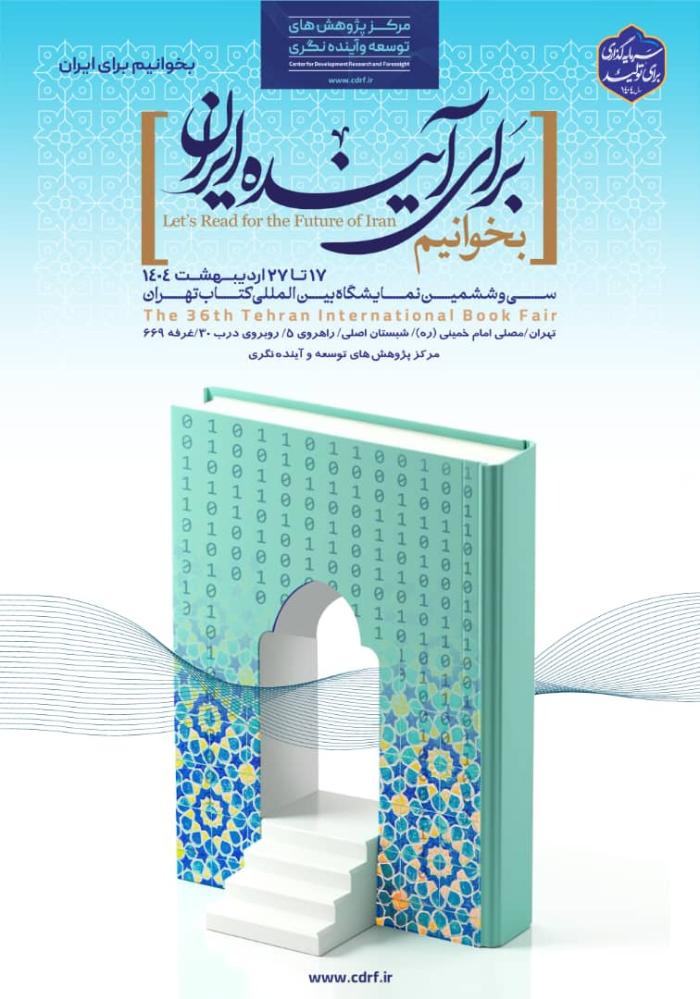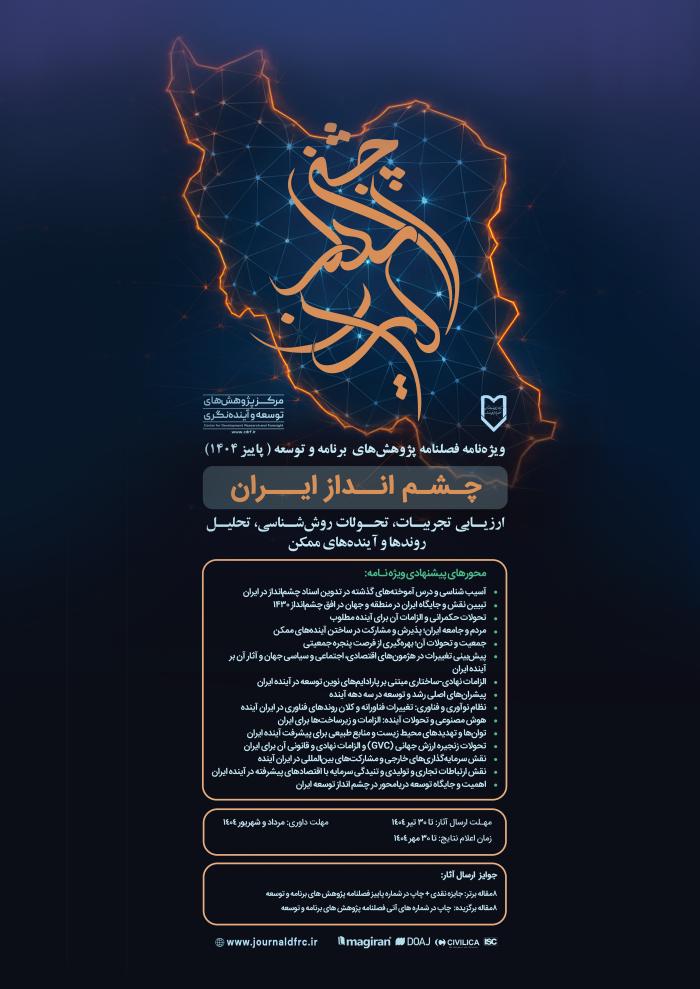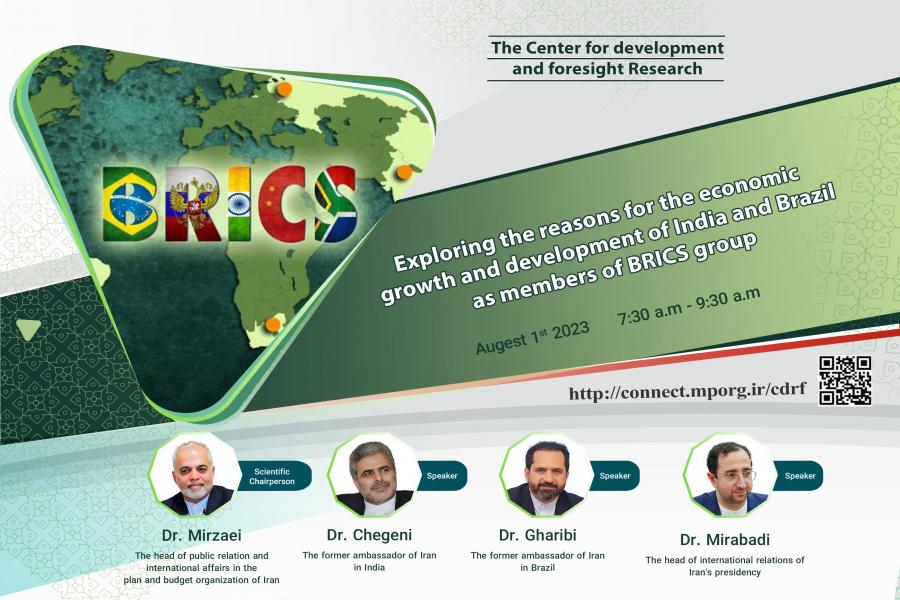


-
بررسی آییننامهها و دستورالعملهای برنامه هفتم پیشرفت
-
بررسی عوامل موثر بر افزایش تصادفات و تلفات جادهای و سوانح رانندگی و دادهکاوی تلفات انسانی
-
سازماندهی و بازآرایی فضایی آموزش عالی کشور
-
به روز رسانی سند ملی آمایش سرزمین
-
انجام مطالعات مناطق آزاد به عنوان نواحی پیشران اقتصادی کشور
-
اصلاح ساختار بودجه و پیاده سازی نظام یکپارچه مدیریت اطلاعات مالی دولت (IFMIS)

.png)
At the commencement of the specialized conference of “Exploring the reasons for the success of the development plans of BRICS countries; with a focus on Brazil and India”, Dr. Ali Hossien pour, the Head of International Relations of the Center for Development Research and Foresight, introduced the topics to be discussed in the conference. In this regard, he enumerated the following topics.
- The reasons for the rapid growth of the BRICS countries and the role of this growth in the global economic equations (by focusing on successful experiences).
- the Governance structure of Brazil and India at the planning level
- The role of development-related institutions/actors (private, public, and government sectors) in Brazil and India in the implementation of development plans.
- Fostering economic sectors (industry, services, and agriculture) and the cooperation among these sectors in Brazil and India and focusing on the opportunity exploitation
- International interaction strategies in the economic development diplomacy of Brazil and India.
- The common interests of Iran in the BRICS group membership.
- The harmony between the title of this conference and the participation of Iran President in the BRICS summit in the first week of September.
According to the public relations report of the Center for Development Research and Foresight, the specialized conference of “Exploring the reasons for the success of the development plans of BRICS countries; with a focus on Brazil and India” was held. The conference featured notable speakers such as Dr. Masoud Mirzaei, the Head of the Public Relations Center and International Affairs of the Planning and Budget Organization, Dr. Hossein Gharibi, Ambassador of the Islamic Republic of Iran to Brazil, Dr. Ali Chegini, Director-General of Resilience Economy at the Ministry of Foreign Affairs and former Ambassador of the Islamic Republic of Iran to India, and Dr. Amir Hossein Mirabadi, the Head of the Center for International Interactions at the Vice-Presidency for Science and Technology and the former attaché for technology at the Iranian Embassy in India.

Dr. Mirzaei, as the scientific director of this conference, explained the activities of BRICS and stated that the Islamic Republic of Iran is in the process of joining this group with the same approach. He further added that considering Iran’s deepening relations with BRICS, this membership can help Iran in sanction conditions and increases its strategic depth in international relations. Dr. Mirzaei referred to the development plans of India and Brazil and stated that if we want to address their development plans meticulously, we should pay attention to the economic indices of those countries such as per capita income, poverty reduction, investment attraction, reduction of the unemployment rate, and GDP growth. He added that regarding India’s development plans, this country has experienced about eight percent economic growth in recent years, and according to predictions, it will be the second-largest economy in the world by 2050.
Regarding Brazil’s development plans, Dr. Mirzaei stated that Brazil followed its growth trend after World War II and formed the largest economy in South America. The economy of Brazil has been relatively controlled in terms of inflation and now it stands among the first twelve highly prosperous economies, he added.

In the continuation of this conference, Dr. Hossein Gharibi, Ambassador of the Islamic Republic of Iran to Brazil, expressed Brazil’s development trends in recent years. He stated that Brazil, with a population of over two hundred million, is known as the largest country in South America and consists of twenty-seven states. He also added that Brazil has had long-established trade relations with Iran for about 120 years.
Dr. Gharibi referred to Brazil’s export and import trends and stated that since the 1970s trade has begun to grow in Brazil and from 2000 onwards and the trade volume has increased from 50 billion dollars to 500 billion dollars annually, indicating the internationalization of Brazil’s economy. In 1960 about 60 percent of Brazilians were engaged in agriculture activities while in 2022 fifteen percent of people were employed in this sector. He also mentioned that it is of great importance to note that Brazil provides food for nearly one and a half billion people. In the Brazilian economy, soybeans, cotton, coffee, etc. are produced by using modern technologies which is the main cause of decreasing employment rate in this field, in comparison to other areas, and the growth of GDP. Dr. Gharibi further referred to Brazil’s experience in controlling inflation and stated that until the 1990s Brazil faced inflation rates of one thousand six hundred percent; however, now, Brazil’s inflation rate is around four percent and is fluctuating between three to five percent.
Regarding privatization in Brazil, Dr. Gharibi stated that investment in the public sector has decreased dramatically and the private sector investment has become a motive force that brought development to Brazil. Both the Brazilian oil company and the Brazilian aircraft manufacturing company have undergone the privatization process. Along with the activation of the private sector, successful agricultural cooperatives have also been formed, Dr. Gharibi added. The role of the federal government in the economy has greatly diminished and private organizations are now turning the wheels of the economy. He also added that Brazil’s current economic growth rate is two percent, and the total volume of exports and imports in Brazil is currently 600 billion dollars.
Continuing on the topic of Iran-Brazil relations, Dr. Gharibi stated that the economies of Iran and Brazil are complementary to each other. For example, considering Brazil’s agricultural needs, this country hosts the production of one million tons of urea fertilizer from Iran and also needs Iranian gasoline, diesel, and petrochemical products. He stated that Brazil also plays an important role in ensuring Iran’s food security, thus, the geographical distance does not affect these countries' relationships adversely.

The next speaker of this conference, Dr. Ali Chegeni, Director-General of Resilience Economy at the Ministry of Foreign Affairs and former Ambassador of the Islamic Republic of Iran to India, stated that while India faced numerous financial problems before the 1980s, it managed to develop in a way that impressed international societies. He boldly stated that today’s highly-developed India is, mainly, the result of the private sector endeavors throughout the previous decades. Therefore, for materializing its development objectives, the Indian government has left many of the crucial activities to the private sector. He believed India’s economic power was formed by strengthening the middle class and relying on educated youths as two main motive forces for development.
.png)
As the last speaker, Dr. Amir Hossein Mirabadi, the Head of the Center for International Interactions of the Vice Presidency for Science and Technology and the former technology attaché of the Iranian Embassy in India, stated that for BRICS, cultural issues and exchange of human resources have always been of interest to member countries.
Dr. Mirabadi mentioned the diverse events in India and stated that the trend of employment in India is strongly declining and entrepreneurship is a movement that the National Institution for Transforming India (NITI Aayog) is pursuing through cultural promotion and implementation among the youths in India. Dr. Mirabadi also referred to the serious and accurate monitoring of India’s development plans and stated that India’s development plans are carefully monitored and supervised. He added it is of pivotal importance to know that has focused on the building of a unique country image.
Dr. Mirabadi also stated that Indians are also pioneers in the field of space exploration and they have made the space industry economically viable in the world. He stated that the main reason for the economic feasibility of the space industry in India is mainly pertinent to the participation of the private sector in this field.

In the end, Dr. Shafei, the coordinator of the conference, thanked the speakers and expressed his gratitude on behalf of the Center for Development Research and Foresight.



